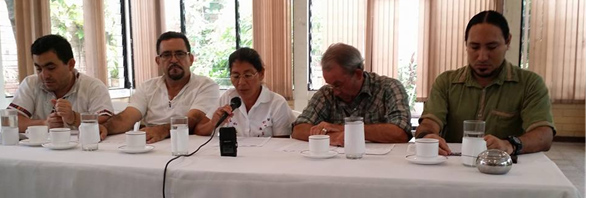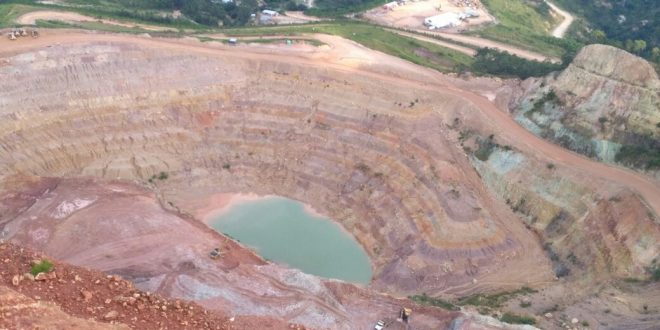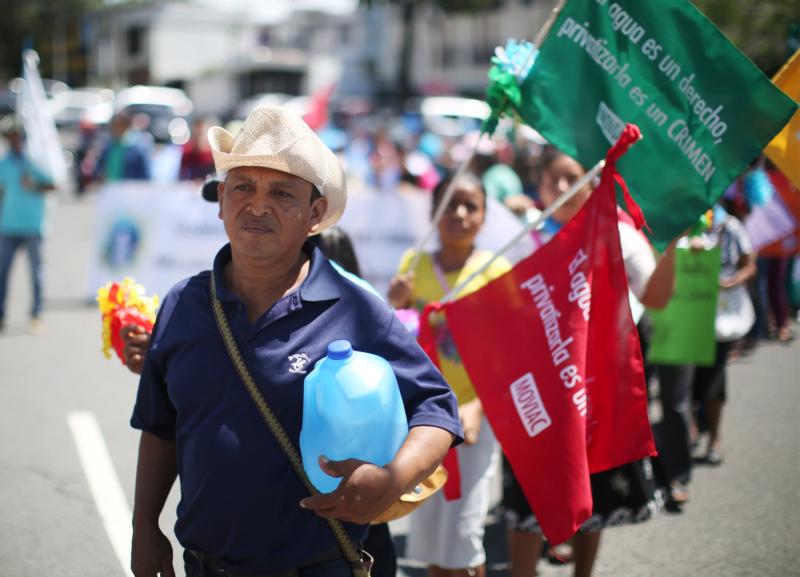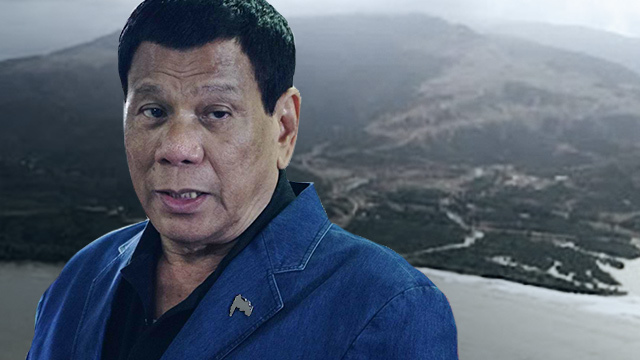- Details
-
Category: Pacific Rim/OceanaGold
-
Published: Monday, 04 June 2018 15:19
Melbourne, Australia - In May 2013, the Maritime Union of Australia took part in an International Fact Finding Mission to El Salvador.
The study group came from a broad group of countries and backgrounds to the most densely populated country in Central America and began with a two day seminar at the University of Central America. We met with various groups and members of the National Roundtable Against Metal Mining - La Mesa.
El Salvador had not issued any mining permits since 2008 and we were made aware of the water crisis facing the country and the threats and assassinations against people and groups opposed to mining.
We gave a guarantee we would give our solidarity and support to the people we met in El Salvador, that had been struggling to defend their environment and live dignified lives.
In September 2013 PacificRim, the company that had filed an Investor State Dispute Settlement case against El Salvador for $300m had been brought out by OceanaGold, an Australian Canadian company whose headquarters were in Melbourne.
We arranged for Vidalina Morales of ADES from CabaûÝas in El Salvador who had been at the forefront in the fight against mining to visit Australia. Vidalina gave radio interviews and spoke to meetings all over Australia and at what was the first rally out front of OceanaGoldãs office in Collins Street Melbourne.
Since then we have held over 51 rallies outside their office. At every rally we name the courageous people whose blood was spilt in defence of their community.
Marcelo Rivera
Ramiro Rivera
Felicita Escheverria
Dora Alicia Recinos Soto and her unborn child
Jose Duran
These are not statistics but people whose names need to be heard by the people making decisions in their boardrooms of Collins Street.
Congratulations to El Salvador for their victory against this avaricious mining company but we are aware the damages awarded to them did not account for their costs in this case. We believe its treasonous for any country to hand over their sovereignty to a Washington tribunal of bankers.
To La Mesa and the groups that agitated for El Salvadorãs 2017 legislation to ban mining we congratulate you. We will continue to give our solidarity and support to you until OceanaGold and its subsidiary companies leave El Salvador.
We can learn from you, that we can live without gold but we cannot live without water.
- Details
-
Category: Media Releases
-
Published: Thursday, 31 May 2018 13:52
PRESS RELEASE

San Salvador, May 31st 2018. Last week the Environment and Climate Change Committee of the Legislative Assembly moved to archive all files and petitions related metallic mining in El Salvador, declaring that the "subject is closed" because ãthere is already a Law that permanently prohibits itã.
Organizations that for years have led the antimining struggle in El Salvador such ADES, CRIPDES, UNES, ARPAS and UCA welcome this action because before the new legislature was installed, we warned the country about the dangers of reverting of this Law and we demanded that the newly elected legislators maintain the prohibition of mining.
Read more ...
- Details
-
Category: Regional News
-
Published: Thursday, 10 May 2018 17:07
Gloria Silvia Orellana - Diario CoLatino
 Manuel Pûˋrez Rocha, fellow from the Institute for Policy Studies (IPS), participated in the Regional Meeting of the Central American Alliance Against Mining. His talk focused on the advances of corporate rights, which through legal instruments such as free trade and investments agreements are strengthening the power of multinational corporations ã TNCs, and undermining the sovereignty of the countries of Latin America."There is currently a strong debate about agreements that give TNCs what is left of our public services. These agreements have been negotiated by many Latin American countries", he said.
Manuel Pûˋrez Rocha, fellow from the Institute for Policy Studies (IPS), participated in the Regional Meeting of the Central American Alliance Against Mining. His talk focused on the advances of corporate rights, which through legal instruments such as free trade and investments agreements are strengthening the power of multinational corporations ã TNCs, and undermining the sovereignty of the countries of Latin America."There is currently a strong debate about agreements that give TNCs what is left of our public services. These agreements have been negotiated by many Latin American countries", he said.
Read more ...
- Details
-
Category: Regional News
-
Published: Wednesday, 09 May 2018 18:33
Edgardo Ayala - IPS News
 (IMAGE) Residents of the municipality of San Rafael Las Flores maintain a permanent sit-down in front of the Constitutional Court, in the centre of Guatemalaãs capital, to demand that the country's highest court rule on the demand for a suspension of the San Rafael mining company's permit to operate a mine in that municipality. Credit: Edgardo Ayala / IPS
(IMAGE) Residents of the municipality of San Rafael Las Flores maintain a permanent sit-down in front of the Constitutional Court, in the centre of Guatemalaãs capital, to demand that the country's highest court rule on the demand for a suspension of the San Rafael mining company's permit to operate a mine in that municipality. Credit: Edgardo Ayala / IPS
GUATEMALA CITY, May 4 2018 (IPS) - Rosa DûÀvila is busy cooking ears of corn, to be eaten by the men and women who have set up a checkpoint on the side of the road to block the passage of supplies sent to a mining company that operates in the area.
The San Rafael mining company, a subsidiary of the Canadian company Tahoe Resources, is located on the outskirts of San Rafael Las Flores, a town 96 km southeast of Guatemala City, in the department of Santa Rosa.
The roadblock has been mounted by the inhabitants of Casillas, a neighbouring rural municipality, located a few kilometres down the road, and which cannot be avoided on the way to the mine. Other transit points have also been blocked by the ãresistanceã, as the anti-mining protesters refer to themselves.
Read more ...
- Details
-
Category: Water Crisis El Salvador
-
Published: Tuesday, 08 May 2018 15:44
Melissa Vida : America Magazine
 The archbishop of San Salvador, Jose Luis Escobar Alas, points to Blessed Oscar Romeroãs portrait on a shelf in his office. ãBlessed Romero, is, without a doubt, a role model for us,ã he tells America. ãHe is the one who marked a turning point in our history, when the [Salvadoran] Church became preoccupied with human rights.ã
The archbishop of San Salvador, Jose Luis Escobar Alas, points to Blessed Oscar Romeroãs portrait on a shelf in his office. ãBlessed Romero, is, without a doubt, a role model for us,ã he tells America. ãHe is the one who marked a turning point in our history, when the [Salvadoran] Church became preoccupied with human rights.ã
Over the past decade, the Salvadoran Church has been increasingly vocal about a dire human rights situation in this country: the access to fresh water. In 2017, the archdiocese, along with the Jesuit-run University of Central America, spearheaded the movement to ban mining for gold and other metals, practices that produced considerable water pollution. Now the church is working to protect the human right to water and fighting the privatization of the resource.
ãWater is monopolized and contaminated by industries,ã Archbishop Escobar Alas says. ãThere isnãt a law that guarantees the access to water for the poor, the people, the multitudes, but there is total freedom for businesses.ã (Cardinal Gregorio Rosa ChûÀvez, appointed by Pope Francis last year, is the auxiliary bishop of San Salvador.)
For nearly two decades, El Salvador has considered but failed to pass such a comprehensive law. Instead there are many contradictory and hypertechnical laws, with loopholes that allow the abuse and misuse of water.
Read more ...
- Details
-
Category: Pacific Rim/OceanaGold
-
Published: Tuesday, 08 May 2018 15:32
By Robin Broad and John Cavanagh : Rappler
This year is a key time to act on OceanaGoldãs reforestation scam and the other problems from mining, given that its current 25-year mining agreement expires in 2019
 On April 9, President Duterte issued a warning to mining companies in a speech in Davao City: "I do not want to see bald mountains in the areas you have mined. I want to see trees as tall as me in 6 months. If I don't see any in the area you destroyed, consider your permit revoked."
On April 9, President Duterte issued a warning to mining companies in a speech in Davao City: "I do not want to see bald mountains in the areas you have mined. I want to see trees as tall as me in 6 months. If I don't see any in the area you destroyed, consider your permit revoked."
These are bold and important words. The Philippines hosts dozens of major mining companies, many of them operating environmentally-destructive open-pit mines. Planting trees is a standard requirement in mining agreements. But, as suggested by President Duterte's warning, it is not one always taken seriously by mining companies.
A case in point is one of the Philippines' largest open pit mines: that of Australian-Canadian mining giant OceanaGold in the municipality of Didipio in Nueva Vizcaya. OceanaGold has been operating the Didipio mine since 2013. As we saw for ourselves in research trips there in 2013 and 2017, it has not met its reforestation requirements.
Read more ...


 Manuel Pûˋrez Rocha, fellow from the Institute for Policy Studies (IPS), participated in the Regional Meeting of the Central American Alliance Against Mining. His talk focused on the advances of corporate rights, which through legal instruments such as free trade and investments agreements are strengthening the power of multinational corporations ã TNCs, and undermining the sovereignty of the countries of Latin America."There is currently a strong debate about agreements that give TNCs what is left of our public services. These agreements have been negotiated by many Latin American countries", he said.
Manuel Pûˋrez Rocha, fellow from the Institute for Policy Studies (IPS), participated in the Regional Meeting of the Central American Alliance Against Mining. His talk focused on the advances of corporate rights, which through legal instruments such as free trade and investments agreements are strengthening the power of multinational corporations ã TNCs, and undermining the sovereignty of the countries of Latin America."There is currently a strong debate about agreements that give TNCs what is left of our public services. These agreements have been negotiated by many Latin American countries", he said. (IMAGE) Residents of the municipality of San Rafael Las Flores maintain a permanent sit-down in front of the Constitutional Court, in the centre of Guatemalaãs capital, to demand that the country's highest court rule on the demand for a suspension of the San Rafael mining company's permit to operate a mine in that municipality. Credit: Edgardo Ayala / IPS
(IMAGE) Residents of the municipality of San Rafael Las Flores maintain a permanent sit-down in front of the Constitutional Court, in the centre of Guatemalaãs capital, to demand that the country's highest court rule on the demand for a suspension of the San Rafael mining company's permit to operate a mine in that municipality. Credit: Edgardo Ayala / IPS The archbishop
The archbishop On April 9, President Duterte
On April 9, President Duterte